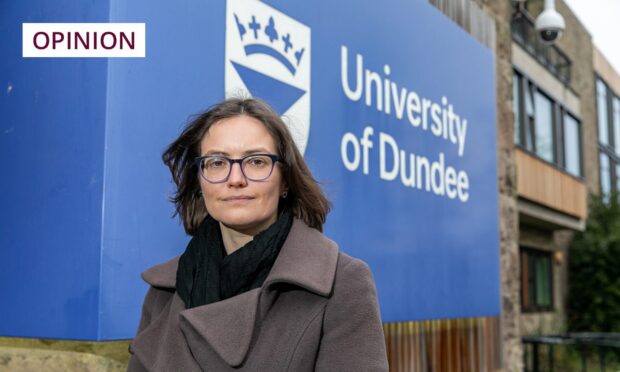Sir, – It is little wonder Labour and Conservative politicians in Scotland got a whipping at the general election.
Labour prospective candidate Emily Thornberry at a hustings in Nottingham went on a rant “I hate the SNP, I hate the SNP”.
Not sure if this qualifies for an arrest under the hate crime laws.
Meanwhile British Tory leader in Scotland candidate Michelle Ballantyne vowed “tough love” for those unfortunate to be unemployed and on benefits.
That is the most crass statement I have ever heard and am not sure what it means.
These comments I would think will not do their respective parties much chance of recovery in Scotland, but it may shed some light on their own personal mindset.
Bryan Auchterlonie.
Bluebell Cottages,
Perth.
Blame deflected, but is police house in order?
Sir, – There has been quite a lot of comment on Broughty Ferry Police Station and its poor physical condition but I think the Police Authority themselves must take some responsibility for this.
In the early years of the 21st Century, Tayside Police decided their current location (and now their current location) in Broughty Ferry wasn’t fit for purpose so they refurbished a larger, two storey building more or less across the street.
This included a large car park behind it with a security entry. A garage business located there had to move to facilitate this.
It was all very nicely done and must have cost a pretty penny. The opening was attended by various dignitaries.
I was invited as the then chairwoman of Broughty Ferry Community Council and remember wine and canapés, chatting to the chairman of Broughty Ferry Traders, senior planning officials, local councillors etc and of course senior police personnel.
Broughty Ferry Community Council welcomed the beginning of a better police presence in central Broughty Ferry.
Sadly, it was not to be.
The opening hours got fewer and fewer and finding a policeman at the police station became as rare as hen’s teeth.
Then in 2018, Police Scotland announced they were moving back across the street to their previous premises. This begs a few questions.
If it wasn’t fit for purpose in the early noughties, why would it be fit for purpose now?
Why were they even retaining a building that was theoretically of no use to them?
Couldn’t it have been sold to a commercial enterprise being as central Broughty Ferry is a desirable commercial location?
I don’t recall any works being done on the old building in the intervening period.
Was building maintenance being kept up? I suspect not.
Why bother to maintain a building except in the most basic way if it’s not being used.
If the money that was used to do up its new location across the street had been spent on this building, the roof wouldn’t be falling in.
Just as importantly the benefits of upgrading the building across the street, including its high spec car park, would not now be going to benefit the commercial enterprise that intends to move into it.
Before Police Scotland shame the Scottish Government for budget cuts, they may care to reflect on this pointless waste of their own funds on this tale of two buildings.
Anya Lawrence.
74b Gray Street,
Broughty Ferry.
Protecting our farming land
Sir, – In Saturday’s paper (Courier, January 25) you showed a picture highlighting the worldwide news story of biblical plagues of locusts ravaging the crop growing areas of East Africa, yet at the same time we passively accept the degradation of our own farmland in the name of rewilding.
I don’t think it is controversial to remind readers that beavers create wetlands.
Wetlands on agricultural land destroy the ability of that land to grow crops.
The choice is as straightforward as that.
Worldwide, prime agricultural land is a scarce resource, in Scotland making up less than 10% of our land mass and largely created by the agricultural improvements of the 18th Century.
Its value still remains recognised in the historically based planning process, where its use continues to involve extra restrictions.
So do we play our part in minimising our impact on the planet by contributing the food producing resources that we have in our own country or do we freeload off other countries by greenwashing our consciences away through reverting productive farmland to wetland?
Not only have we dominated and bullied Third World countries through our economic power, I find it deeply troubling that we find it acceptable to contemptuously degrade our own farmland as though it is worthless, thereby increasing the pressure in world markets to buy the commodities we choose not to produce here.
If you can spare the time, then please at least give a moment’s thought to the farmers in Africa, even if you choose to overlook the contradiction provided by Scottish Natural Heritage’s exploration of the use of taxpayers’ money to “incentivise the presence of beavers on land”, thereby funding incubator populations whose spread farmers are left to control at their own expense.
The destruction being wrought in Africa on populations least able to defend themselves means it is time to call out the imposed rewilding of our prime agricultural land for what it is; politically expedient gesture politics of the most sanctimonious and morally indefensible kind.
Euan Walker-Munro.
Mains of Kinnettles,
Forfar.
Fighting fire with fire
Sir, – Michael Russell has made a plea to the Commons Speaker to clamp down on the rowdy abuse of SNP MPs by their counterparts on the Conservative benches.
What if Blackford’s team responded in kind – targeting mainly Boris Johnson (ultimately responsible for the behaviour of his MPs in the absence of any intervention from an ineffectual Speaker)?
Perhaps one should fight fire with fire, acting in ways that cause maximum disruption and getting under Boris’s skin.
“I spy strangers!” is another stratagem.
The House must then evacuate.
What’s sauce for the goose…
James Stevenson.
Drummond Avenue,
Auchterarder.
Danger to indy schools
Sir, – A little-known Bill being pushed through the Scottish Parliament is supposed to bring equality regarding rates relief.
When it comes to independent schools, it will actually bring an unfair bias by denying rates relief to all private schools except musical schools.
Scotland has an educational framework called Getting it Right for Every Child which focuses on the wellbeing of the child in theory.
But by removing the rates relief on many faith-based schools, they will be forcing some of these schools to close, which is getting it badly wrong for those children affected.
Can it be that in the mind of the Scottish Government, music is more important than the faith that is at the centre of these children’s lives?
Ian Paynter.
15 Inglewood Crescent,
East Kilbride,
Glasgow.










